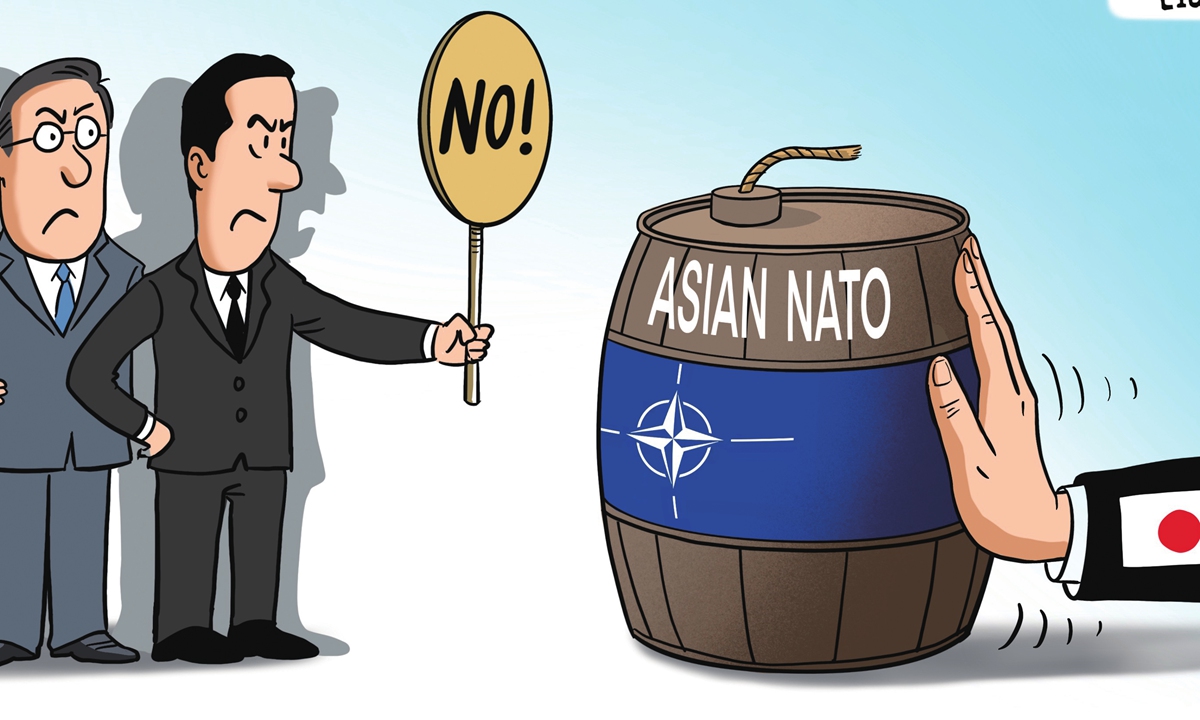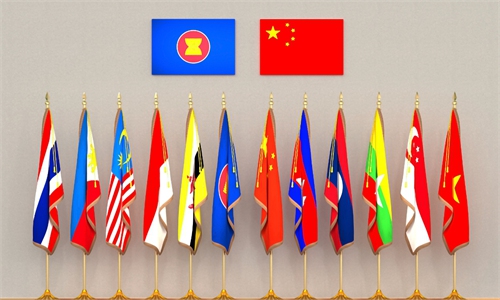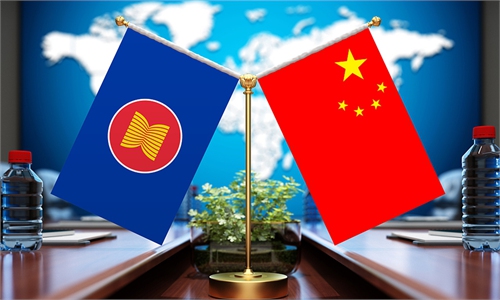
Illustration: Liu Rui/GT
The 44th and 45th ASEAN Summits and leaders' meetings on East Asia cooperation are being held this week, with leaders or representatives from the 10 ASEAN countries, as well as China, Japan, South Korea, India, Australia, New Zealand, Russia and the US, gathering in Vientiane, the capital of Laos. During the 27th China-ASEAN Summit on Thursday, leaders of China and ASEAN countries announced the substantial conclusion of the Version 3.0 China-ASEAN Free Trade Area (FTA) upgrade negotiations. This important achievement signifies a joint effort by China and ASEAN to lead economic integration in East Asia, demonstrating both sides' strong support for multilateralism and free trade. It also reaffirms that the pursuit of stability, cooperation and development remains the unshakeable mainstream in the region.
Notably, prior to the ASEAN Summit, high-level officials from countries like the US and Japan hinted at bringing camp confrontation and geopolitical conflicts into the meeting. However, this intention was met with clear resistance. In particular, the idea of a so-called Asian NATO, proposed by Japan's new Prime Minister Shigeru Ishiba, faced a strong backlash in the region. Malaysian Foreign Minister Mohamad Hasan bluntly stated, "We do not need NATO in ASEAN," while Indonesia's largest English-language newspaper, the Jakarta Post, warned that an "Asian NATO" aims to band against China, which is "very offensive" for the 10-member ASEAN. This significant pushback forced Ishiba to abandon any mention of "Asian NATO" at the meeting.
The failure of the "Asian NATO" idea highlights several issues. First, it demonstrates that, unlike the self-satisfied perception of NATO and the US' allies, NATO is viewed as a "harbinger of disaster" by other nations. NATO's actions to enhance its image through stirring up public opinion and to expand its influence by creating and exploiting geopolitical conflicts have only solidified its image as a creator of conflict and chaos in the eyes of other countries. Public sentiment in ASEAN countries reveals a clear disdain for NATO. Describing the organization as a "Cold War zombie" is not an exaggeration; in the minds of regional countries, it should have been swept into the dustbin of history long ago.
Second, regional countries are not merely opposed to introducing the NATO model to the Asia-Pacific, but also against importing NATO's Cold War mentality and camp confrontation, as well as positioning China as a hypothetical enemy in geopolitical conflicts. The principles of NATO and those of Asian countries are distinctly different. NATO is primarily a military alliance of Western countries, while Asian countries prioritize independence and autonomy. NATO's mission is to promote so-called deterrence and defense primarily through military might, whereas Asian countries value peace and emphasize development. NATO's obsession with external intervention often tramples on the sovereignty and human rights of other nations, while many Asian countries have painful histories of colonization and invasion, making them deeply resentful of external interference. Moreover, Asian nations embrace "Oriental Wisdom." Having learned that the ocean is vast because it admits all rivers, Asian countries are able to see clearly that "gunboat diplomacy" or "bully logic" lead nowhere while openness and inclusiveness are the right path.
NATO maintains its existence by creating a common external threat. However, such a threat does not exist in Asia, and attempts to direct conflict toward China will not succeed. China has maintained its position as ASEAN's largest trading partner for 15 consecutive years, and ASEAN has been China's largest trading partner for four years in a row. As a trustworthy friend and reliable partner, China firmly supports the construction of the ASEAN community, backs the bloc's central role in regional cooperation, and advocates for ASEAN to play a greater role in international affairs. The comprehensive and high-quality implementation of the RCEP, along with projects like the China-Laos Railway and the Jakarta-Bandung High-Speed Railway, serves as a testament to the Belt and Road Initiative, while emerging industries such as the digital economy and green economy are generating powerful momentum for cooperation. A survey released in April by the ISEAS-Yusof Ishak Institute in Singapore indicated that ASEAN countries view China more favorably than they do to the US. Nikkei Asia acknowledged that even in the Philippines, observers deem the idea of an "Asian NATO" as unrealistic.
We noticed that some Western media outlets have reflected on the reasons for the failure of the "Asian NATO" idea, and such reflections should not remain superficial. During the leaders' meetings on East Asia cooperation, Ishiba expressed willingness to strengthen high-level exchanges, intensify dialogue and communication at all levels, and push for steady and long-term development of Japan-China relations, which is a commendable attitude.
We hope that this year's leaders' meetings on East Asia cooperation serve as a reminder to all external countries: the region welcomes partners in peaceful development, but not those that create trouble and conflict.



